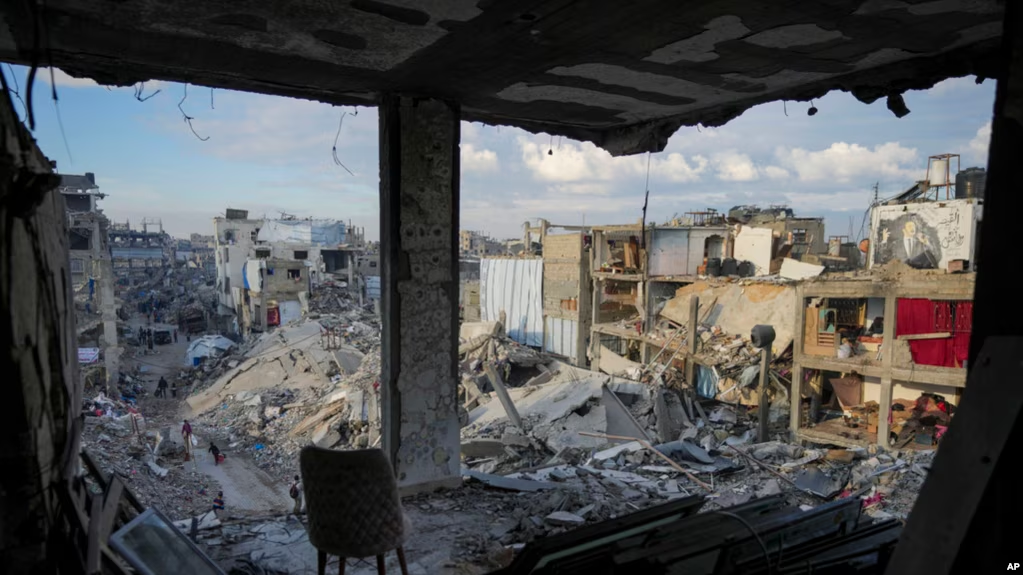

WASHINGTON DC: Leaders from both U.S. allies and adversaries sharply criticized President Donald Trump’s proposal on Wednesday, which suggested that the United States take control of the Gaza Strip, relocate 2 million Palestinians to other nations, and transform the territory along the Mediterranean Sea into “the Riviera of the Middle East.”
The international response to Trump’s proposal, presented during a White House news conference on Tuesday alongside Israeli Prime Minister Benjamin Netanyahu, was immediate and overwhelmingly negative, according to VOA.
Britain, China, Germany, Ireland, Russia and Spain all said they continue to support a two-state solution — creation of an independent Palestinian state that would include Gaza and the Israeli-occupied West Bank existing next to Israel.
The two-state proposal, aimed at ending decades of Middle East conflict and wars, has long been the bedrock of U.S. policy in the region even though Netanyahu’s government opposes it.
Saudi Arabia, an important oil-producing American ally in the Middle East, weighed in quickly in a sharply worded statement, saying its call for an independent Palestinian state was a “firm, steadfast and unwavering position.”
“Australia’s position is the same as it was this morning, as it was last year, as it was 10 years ago,” Australian Prime Minister Anthony Albanese said in support of a two-state solution.
Netanyahu offered support for the plan, saying Tuesday that one of his war goals is to ensure that Palestinian militant group Hamas never again poses a threat to Israel.
But Trump, Netanyahu said, is “taking it to a much higher level.”
“I think it’s something that could change history, and it’s worthwhile really pursuing this avenue,” he added.
Trump was noncommittal when asked Tuesday whether he supports the two-state solution. His plan on Gaza “doesn’t mean anything about a two-state or one-state or any other state,” he said.
Palestinians, nearby countries reject Trump ideas
Palestinian President Mahmoud Abbas called for the United Nations to “protect the Palestinian people and their inalienable rights,” saying that what Trump wanted to do would be “a serious violation of international law.”
Hamas said Trump’s Gaza proposal was a “recipe for creating chaos and tension in the region. Instead of holding the Zionist occupation accountable for the crime of genocide and displacement, it is being rewarded, not punished.”
Even before Trump called for U.S. ownership of Gaza, Egypt and Jordan had in recent days rejected his suggestion that Gaza’s Palestinian population be relocated to their countries.
Egypt’s foreign ministry issued a statement stressing the need for rebuilding in Gaza “without moving the Palestinians out of the Gaza Strip.”
United Nations human rights chief Volker Türk said Wednesday that deporting people from Israeli-occupied Gaza was illegal.
“The right to self-determination is a fundamental principle of international law and must be protected by all states, as the International Court of Justice recently underlined afresh,” Türk said in a statement. “Any forcible transfer in or deportation of people from occupied territory is strictly prohibited.”
Later, U.N. Secretary-General Antonio Guterres said in a speech that “in the search for solutions, we must not make the problem worse. It is vital to stay true to the bedrock of international law. It is essential to avoid any form of ethnic cleansing.”
But Trump said at his news conference that Jordan’s King Abdullah and Egyptian President Abdel Fattah el-Sissi would come around to his idea of deporting the Palestinians from Gaza, contending the two countries will “open their hearts and will give us the kind of land that we need to get this done and people can live in harmony and in peace.”
Trump’s Gaza proposal was his first major Middle East policy statement since taking office for a second four-year term two weeks ago.